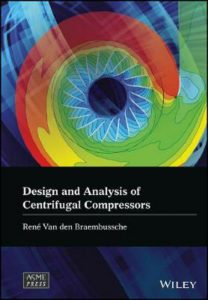Design and analysis of centrifugal compressors
Design and analysis of centrifugal compressors
Design and Analysis of Centrifugal Compressors is a comprehensive overview of the theoretical fluid dynamic models describing the flow in centrifugal compressors and the modern techniques for the design of more efficient . The author — a noted expert in the field, with over 40 years of experience — evaluates relevant numerical and analytical prediction models for centrifugal compressors with special attention to their accuracy and limitations. Relevant knowledge from the last century linked with new insights obtained from modern CFD. Emphasis is to link the flow structure, performance and stability to the geometry of the different compressor components.
A radial compressor can be divided into different parts, as shown in Figure 1.1. The flow is aspirated from the inlet plenum and after being deflected by the inlet guide vanes (IGV), it enters the inducer.
You can also Read Pumps and compressors 2019
Design and analysis of centrifugal compressors Content
- Preface
![Design and analysis of centrifugal compressors]()
- Acknowledgements
- List of Symbols
- Introduction
- Compressor Inlets
- Radial Impeller Flow Calculation
- The Diffuser
- Detailed Geometry Design
- Volutes
- Impeller Response to Outlet Distortion
- Operating Range
- Bibliography
- Index
After leaving the impeller, rapid mixing takes place between the two zones due to the difference in angular momentum (mixing region). This intensive energy exchange results in a fast uniformization of the flow.
The flow further decelerated by an area increase corresponding to the radius increase of the vaneless diffuser and influenced by friction on the lateral walls. In case of a vaned diffuser, the flow, after a short vane less space, enters the semi-vane less space, i.e. the diffuser entry region between the leading edge and the throat section where a rapid adjustment rearranges the isobar pattern from-nearly circumferential to perpendicular to the main flow direction. If the Mach number is higher than one, a shock system may decelerate the flow such that the throat section becomes subsonic.


Comments are closed.